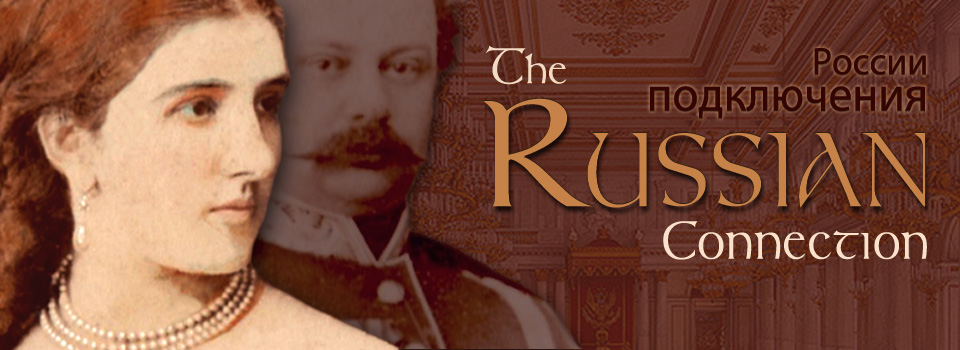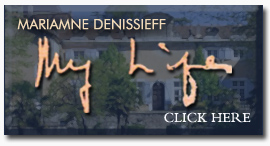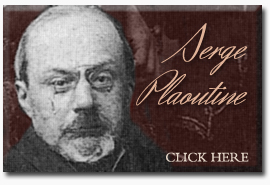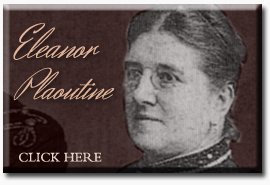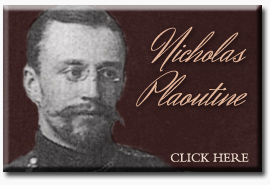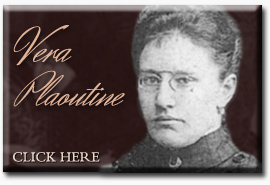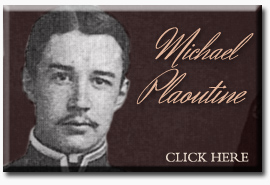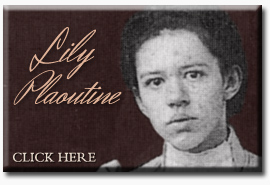The Russian Connection
The Family of Romanov. The Tsar. Imperial Russia. The Russian Revolution. Those don't exactly sound like they fit in with the history of a Cornish family in such an out-of-the-way place as Port Eliot. In fact, it took a couple years of researching before I happened on any major connection — and as it happened to be just the name "Serge de Plaoutine" in the English probate calendar, I thought for some months that the family came from France. Little would you know, from that small mention alone, that the great-great-granddaughter of the first Lord Eliot would marry "one of the wealthiest landowners" in Imperial Russia.
Any story of Russian aristocracy rather fascinates me, I think because it is like having a glimpse into a fairy-tale-like kingdom that is gone forever and can never be recreated. Not that the Russian nobility were all heroes from a fairy tale. Far from it. But photographs and memoirs offer an amazing opportunity to peak into an era of almost unimaginable earthly splendour, a society that was destroyed by the evils of Communism — a belief that can only be propagated in a nation filled with an ignorant, uneducated populous. Too many places in the world are on the brink of a similar catastrophe, and if the facts of this previous horror are not perpetuated, then the same thing will happen again. For this reason, it seems worthwhile and necessary to piece together the stories of this evil uprising and its consequences, and that is part of the overall fascination for me.
Getting back to my research of the Plaoutine family, it began in 2013, coming to me by sheer accident! When I had started researching the Eliot family history more than a year earlier, I was really concentrating on the 18th-century characters surrounding Edward James Eliot, best friend of the great William Wilberforce. It was not until I attempted to trace his great-grandchildren that I came across a probate listing for Eleanor Hester Mary de Plaoutine, wife of Serge de Plaoutine. How interesting! A French connection (so I thought). There didn't seem to be much hope in finding living descendants down that line (since I don't speak or read a word of French), so I centered my efforts on some of her siblings. Well, seeing her facts page so empty in the family tree left too large a void, so I decided to trace her . . . just a little.
It didn't take long to discover that "Serge de Plaoutine" was actually Sergei Nikolaevich Plautin of Russia. What to do now? I don't speak a word of Russian and had no idea where to start. Thankfully, through some online forums and message boards, several very kind individuals (some from Russia and some from other parts of Europe) were willing to give me a start by searching through Russian records, translating pages and pointing me to tools that enabled me to do my own searching through Russian sites. It's hard enough to conduct creditable genealogy research in your own language, even harder in a foreign language while attempting to use your own alphabet. It's downright challenging in a foreign language using a totally different alphabet.
It's funny now to look back and read notes from when I was sure that two of Serge and Eleanor's children died in infancy and other similar mistakes, but researching anything in pre-Communist Russia is no easy task. If it hadn't been for the help of others, either in direct answer to my request for help or by someone having posted information on their own website, this family history would not be anything more than some disjointed notes in my desk drawer. With that in mind, I hope that all of this information proves helpful to others trying to research the same names or places. It is amazing how many people I've already met who are trying to work on the same family or have information and photos to add. Hopefully, these pages may come to the attention of others who can help fill in the missing facts and stories.

Before the fascinating connection with the Plaoutines came about, there had already been a number of connections between the Eliot family from St. Germans and the land of Tsars. The first connection seems to be the extended visit to St. Petersburg and its surrounding area by Mrs. Harriot Neale (sister of Edward, 1st Lord Eliot) at the beginning of 1769. She stayed in Russia nearly a whole year, spending much of her time painting watercolour views of the country. These views were sent back to the beloved Port Eliot, where they must have been packed away into a portfolio or trunk and now lay forgotten in some corner or attic. There was also mention of some diamond earrings brought back from St. Petersburg in her will. These were given to Catherine Eliot (wife of the above mentioned Edward) on Mrs. Neale's death and must have long-ago been incorporated into the Eliot family jewels to be saved, passed on or reset. Sadly, none of these early Russian souvenirs have been located at Port Eliot.
Decades passed before any other visits to the far-away empire were recorded, but in June of 1845, eighteen-year-old Lord Eliot (Edward, oldest son of the 3rd Earl of St Germans) departed his native shores for a lengthy world tour. He was the heir to the now-flourishing Eliot estate and destined for a career in the Army as a member of the Life Guards. All of the older sons of the 3rd Earl of St Germans were sent on "grand tours" around Europe (even as far as India), usually as an opportunity for the boys to master foreign languages. (Just why Edward was sent on a Russian tour is a good question, since that language is never mentioned as any priority or interest within the family.) These tours were usually designed as a continuation of the rather deficient educations the boys had received at England's elite schools and universities. For whatever reason, Edward was sent to the shores of Gronstadt, from whence he embarked on a busy three-month tour. During those months, he was presented to Emperor Nicholas I and his court; dined with Prince Dolgoruky; toured St. Petersburg, Moscow and the country between; viewed palaces, convents, cathedrals; and even caught a glimpse of the prisons where criminals bound for Siberia were held. In August, Edward sailed for home with a good impression of Russian architecture and a less-than-favorable opinion of Russian peasants, whom he thought looked "half civilised" and "frightful".
The Eliot family had further occasions to visit the land of the Cossacks, when two of Edward's younger brothers set off for the cold shores of the Crimea. The clock had moved forward nine years, Europe was in turmoil, and England had allied with her usually sworn enemy, France. Both countries had now declared war on Russia, and Captain Granville Eliot set off with his regiment, one of the most elite in the nation, the Coldstream Guards. Always close to his brothers, Granville sent for his younger brother, Henry (who was actually in the midst of his own "grand tour") to accompany him. Taking advantage of the war to see sights unlike any in England, the two brothers were present (Granville fighting and Henry observing) at the battles of the Alma, Balaclava, Sebastopol and Inkerman. It was there, in the Crimea, at that last battle, that Granville was killed by Russian forces. One of eight Coldstream Guard Officers to die on the field of Inkerman, he was hailed a hero, and the bells at St. Germans pealed out in sorrow.
Granville was buried in the renowned cemetery on Cathcart's Hill, creating a sorrowful and very personal connection between the family so far away in Cornwall and the cold, harsh country across the ocean. Another bit of Russian earth was now "forever England", and devastated 19-year-old Henry returned home, scarred by the awful memory of standing over his brother's body on the battlefield while the battle raged on. He brought back his brother's coat and sword as treasured items to be displayed at Port Eliot for more than fifty years. (Three of Granville's swords remain extant, but the coat is now unmarked and lost in one of the nearly 100 unsorted rooms of family clutter.)
With what must have been sorrow-filled memories, two of Granville's brothers would travel to Russia before many years had passed. Four years after that fateful battle, William Eliot (then a diplomat, later 4th Earl St Germans) was sent as 1st Paid Attache to the British mission in St. Petersburg for a year. Obviously, he enjoyed his time there, writing letters home in detail about the sights he enjoyed. Like his older brother, he particularly enjoyed the architecture. Common souvenirs of the era were mass-printed photos of towns, buildings and scenery, and William certainly brought home his fair share (duly incorporated into the family's scrapbooks). More years passed, and Henry Eliot once again embarked to Russian shores. Now a clerk in the Foreign Office, he returned to the capital city as specially-chosen secretary to the special mission sent to invest Tsar Alexander II with the British "Order of the Garter" in June 1867. Poor Henry never got over his brother's death, so it's likely that his visit was shadowed by memories of his previous excursion.
Just weeks before Henry's arrival in Russia, his cousin, Eleanor Pringle, had married Sergei Nikolaevich Plaoutine, a Colonel in the Imperial Russian Army and A.D.C. to the Tsar. This event formed the strongest tie to the Russian Empire in the history of the Eliot family. Without the benefit of hindsight, however, this must have seemed like just one more advantageous marriage in a family of great connections. Since Eleanor and Serge appear to have settled in Nice, France, for the first year of their marriage, it's unlikely that the closely-knit cousins met during Henry's sojourn in St. Petersburg.
Despite a now-familial tie to the Tsarist country, it doesn't appear that the Eliots of Port Eliot ventured again onto the far-off soil, and their connections were limited to acquaintances in Britain. After the Communist uprising in 1917, innumerable Russian refugees were welcomed to British shores. It was inevitable that any family as connected in diplomatic, political, social and court circles as the Eliots were would come into contact with these nobles in exile, personally and through their English friends. The exiled Dowager Empress Marie Feodorovna was already an acquaintance of the family, being the sister of Queen Alexandra (close to the family), and an old photograph of the royal sisters sitting in a garden still rests in one of the Port Eliot family albums. Even later into the 20th century, Montague Eliot (later 8th Earl St Germans) and his wife, Nelly, requested that Grand Duke Michael of Russia (by then the exiled younger brother of Tsar Nicholas II) stand as sponsor at the christening of their newborn son, Nicholas (later 9th Earl St Germans).

While these connections seem like a rather impressive collection in the history of a remote Cornish family, the best is yet to come by delving into the fascinating story of Serge and Eleanor Plaoutine. Eleanor was second daughter of Colonel John Henry Pringle (the grandson of Edward James Eliot, oldest surviving son of the 1st Lord Eliot). Colonel Pringle and his family spent at least six months of every year in France, so it is no surprise that Eleanor and Serge married in Nice. Exactly how they met is still a mystery, but it seems probable that it may have been through her maternal aunt, Emma Ramsbottom. In 1849, Emma married Colonel Bernard Ernest Jule de Koetteritz who was, presumably, German-born, as his father was a General de Koetteritz of Leipzig. By the time of his marriage to Emma, Bernard was a Colonel in the Imperial Guard of Russia, proving an almost totally elusive character in my research. The de Koetteritzes lived in Florence, Italy, also spending some time in Baden-Baden. Perhaps Eleanor was introduced to Colonel Serge Plaoutine through her aunt and uncle's connections in Russia.
From a research point of view, one of the first major stumbling blocks in tracking down any sort of records were the multiple spellings used for the Plaoutine name — something worth mentioning before moving on here, since it's liable to get a little confusing. Serge was the first member of his family to adopt the French spelling. In Russia, his name was "Sergei Nikolaevich Plautin". In France (and also England), his name was "Serge de Plaoutine". Often, the "de" is dropped, leaving just the plain "Plaoutine", which gives yet another option. All three are correct, because it depends on the language in which those records or papers were written. On the pages here, I've opted for the British/French spelling of the names of Serge and all his descendants. His ancestors are always listed with the traditional Russian spelling. Each person's individual page lists both the French and Russian form of their name, also (whenever possible) I have included their Russian name in the Cyrillic alphabet on their page as well.
Serge was the only surviving son of the renowned Russian General, Nikolai Fedorovich Plautin, so it is not surprising that he and both his sons served as officers in the Russian Army. Serge served as A.D.C. to the Tsar and retired a Lieutenant-General. His oldest son achieved the rank of Major General and a Cossack commander, his youngest son an officer in the Cavalry. Eleanor was a lady of the Russian Court, and both of her daughters served in the same fashion. All four of Serge and Eleanor's children spoke flawless English (as did many of their grandchildren) and travelled throughout Europe during family holidays, though they all lived primarily in Russia. The Plaoutines owned a vast amount of real estate, including the well-known "double house" on the Winter Palace Embankment, 24 Quai de la Cour (stretching back to the next street with the address of 25 Millionnaya Street), which can still be seen in remarkable condition today, sitting beside the palace of Grand Duke Vladimir.
That the Plaoutines were connected with the Romanovs is without doubt. Aside from the military aspect of their relationship, the family preserved a photo and story of their nursery maid, Fanny Coster. Fanny was an Englishwoman employed by Eleanor Plaoutine as a nursery maid (and later as a nurse), while Fanny's sister, Jane, was a nurse to Grand Duchess Xenia's family. The Empress asked for Fanny to nurse Grand Duchess Olga, which Fanny did. Later, Fanny returned to the Plaoutines as housekeeper.
The Plaoutines (being Serge and Eleanor, their children and their grandchildren) held a variety of interests outside of Court life and the military, including Paleontology, Ornithology, Archaeology, Nuclear Engineering, Electrical Engineering, etc. In fact, you can even find a link to the Kennedy Assassination through the family of Lily Plaoutine's husband, Prince Sergei Scherbatoff! There seems to be no end to the interesting connections to be found in this particular branch of the family history.
Sadly, the Bolshevik Revolution of 1917 crushed the Plaoutine family, as it did the rest of the Russian aristocracy. Serge and Eleanor had already retired to a flat at Chateau St. Laurent in Nice, France, but they were left without enough money to support even the simplest lifestyle. By 1921, all four of their children were dead, the fate of two of them probably never even known to the aging and exiled couple, leaving them to spend their last days wondering. Some grandchildren managed to escape to France, some were murdered, some died in battle and several disappeared, changing their names and never contacting any family members again.

The Plaoutine Family Survivors
Many of the surviving members of the once-illustrious family escaped to France and began new lives. Some proved quite successful, one becoming a leading Archaeologist and Historian, and another an Art Critic. In fact, surviving members of the Plaoutine family lived (or live) all over the world. Some in Russia. Some in Algiers. Others in France, Switzerland, Scotland and the USA. But the horrors of the Revolution still exist, even in the minds of many of the Plaoutine descendants, and it's difficult to form any lasting contacts. While their reticence to speak is understandable, the sad fact remains that – as the facts and stories fade away – it will be all too easy for evil to rise again and enslave someone else's children and grandchildren. These pages are an effort to compile as many of those facts and stories as possible, for the good of a future generation.
Thankfully, two family members did write their memoirs, without which many of these fascinating characters would have remained just names and dates on a sheet of paper.
Eleanor Violet Jauncey (niece of Eleanor Plaoutine) spent much time in Russia, Italy and France with her "Russian cousins". In her nineties, Eleanor wrote down her memories of those trips and her cousins. Her sorrow remained fresh to the end, and seventy years had not dimmed her sense of injustice and anger.
Serge and Nell's granddaughter, Mariamne, also wrote down some of her memories. She was quite young when she lived in Russia, but each treasured story gives a child's perspective of the times.

Another fantastic addition to these pages are transcriptions of a number of letters written by young Lily Plaoutine to a friend in England. They offer an interesting peek into a few months of Plaoutine family life in Russia, their Tsarskoe-Selo dacha and their social life in St. Petersburg.
Yet another aspect of this connection comes with the story of the Coster sisters (Fanny was nanny to the Plaoutine children, Jane to the children of Grand Duchess Xenia's family). The niece of Serge and Eleanor Plaoutine saved a photo of them among the family things, and with the help of the identification on the back, I was able to contact descendants of the Coster sisters. Thanks to their help, a handful of letters (written by Jane and Fanny Coster) are also transcribed here, offering another small peek into the life of this lost era.
